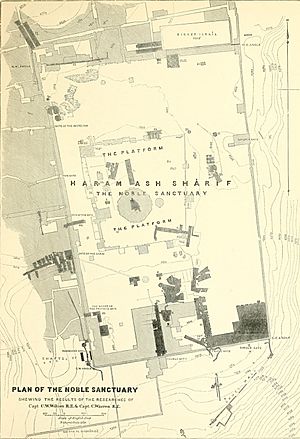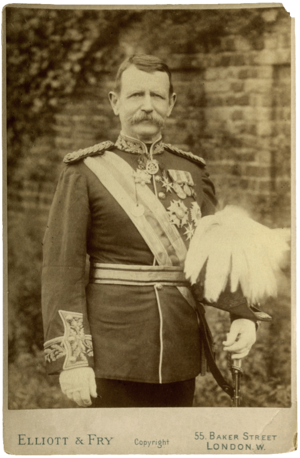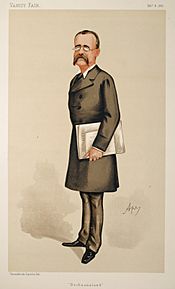Charles Warren facts for kids
Quick facts for kids
General
Sir Charles Warren
|
|
|---|---|
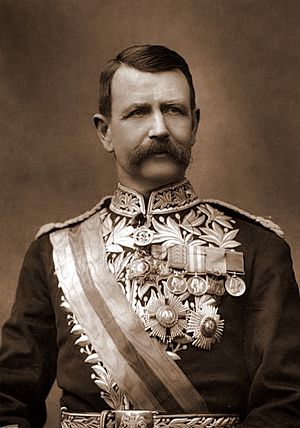
Charles Warren carbon print portrait by Herbert Rose Barraud of London
|
|
| Born | 7 February 1840 Bangor, Gwynedd, Wales |
| Died | 21 January 1927 (aged 86) Weston-super-Mare, Somerset, England |
| Buried |
Churchyard at Westbere, Kent
|
| Allegiance | |
| Service/ |
|
| Years of service | 1857–c.1905 |
| Rank | General |
| Unit | Royal Engineers |
| Commands held | 5th Division, South African Field Force (1899–1900) Straits Settlements (1889–94) Commissioner of Police of the Metropolis (1886–88) Suakim (1886) Bechuanaland Expedition (1884–1885) Northern Border Expedition (1879) Griqualand West Diamond Fields Horse |
| Battles/wars | Transkei War Bechuanaland Expedition Second Boer War
|
| Awards | Knight Grand Cross of the Order of St Michael and St George Knight Commander of the Order of the Bath Mentioned in Despatches Order of the Medjidie, Third Class (Ottoman Empire) |
| Other work | Palestine Expeditionary Fund The Scout Association |
General Sir Charles Warren (born February 7, 1840 – died January 21, 1927) was a British Army officer. He belonged to the Royal Engineers, a special group of soldiers who are also engineers. Warren was one of the first European archaeologists to explore the Holy Land in the Middle East, especially the Temple Mount in Jerusalem.
He spent a lot of his military career in British South Africa. Before that, he was the head of the London Metropolitan Police from 1886 to 1888. This was during the time of the famous Jack the Ripper murders. Even though some of his actions in battle were criticized, he achieved many important things in his long life.
Contents
Early Life and Army Training
Warren was born in Bangor, Gwynedd, Wales. His father was also a Major-General in the army. Charles went to schools in Shropshire and then to military academies. He studied at the Royal Military College, Sandhurst and the Royal Military Academy, Woolwich. On December 27, 1857, he became a second lieutenant in the Royal Engineers.
In 1864, he married Fanny Margaretta Haydon. They had two sons and two daughters. Warren was a very religious man, following the Church of England. He was also a keen Freemason, which is a member of a social and charitable organization.
Military Career and Discoveries
Mapping Gibraltar
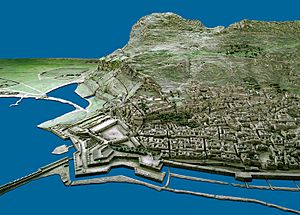
From 1861 to 1865, Warren worked on mapping Gibraltar. He used special math called trigonometry to survey the Rock of Gibraltar. With help from Major-General Frome, he made two very detailed models of Gibraltar. Each model was about 8 meters (26 feet) long. These models showed not just the shape of the Rock and its harbor, but also every road and building. One of these models is still on display at the Gibraltar Museum today. After this work, he was promoted to captain.
Exploring Ancient Jerusalem
In 1867, a group called the Palestine Exploration Fund asked Warren to help with Biblical archaeology. This meant exploring ancient sites related to the Bible, especially in the Holy Land. He led one of the first major excavations at the Temple Mount in Jerusalem. This work started a new era of Biblical archaeology.
His most important discovery was a water shaft and a series of tunnels under the Temple Mount. This shaft is now known as Warren's Shaft.
Warren and his team also made a better map of Jerusalem. They also did the first excavations at Tell es-Sultan, which is the site of the ancient city of Jericho.
After returning to Britain in 1870, Warren wrote several books about his discoveries. These included "The Recovery of Jerusalem" (1871) and "Underground Jerusalem" (1876). His detailed maps and drawings from the excavations were published in 1884.
Service in South Africa
Warren served in different places, including Dover and Shoeburyness. In 1876, he was sent to South Africa to map the border between two areas, Griqualand West and the Orange Free State. For this work, he received an award called the Companion of the Order of St Michael and St George.
During the Transkei War (1877–78), he led a group called the Diamond Fields Horse. He was injured in battle. He was then sent to investigate issues with local people in Bechuanaland and helped stop a rebellion there. In 1879, he became the Administrator of Griqualand West. A town in South Africa, Warrenton, is named after him.
Finding the Lost Expedition
In 1882, Warren was sent to the Sinai Peninsula to find out what happened to an archaeological expedition led by Professor Edward Henry Palmer. Warren discovered that the expedition members had been robbed and killed. He found their remains and helped bring their killers to justice. For this brave work, he was made a Knight Commander of the Order of St Michael and St George. He also received an award from the Egyptian government.
The Bechuanaland Expedition
In December 1884, Warren, now a lieutenant-colonel, led a military expedition to Bechuanaland. His mission was to show that Britain was in charge of the area. He also had to stop groups of settlers from taking land and cattle from the local Tswana tribes.
This expedition, known as the Warren Expedition, included 4,000 British and local soldiers. They even used the first three observation balloons ever used by the British Army in the field. The expedition succeeded without any fighting. Warren was called back to Britain in September 1885 and received another high honor, the Knight Grand Cross of the Order of St Michael and St George.
Head of London Police
In 1886, Sir Charles Warren was chosen to be the Commissioner of Police of the Metropolis. This meant he was the head of the London police force. At that time, the police force was facing many challenges. There were economic problems in London, which led to many public demonstrations.
Warren tried to improve things for his police officers. However, he often disagreed with the Home Secretary, Henry Matthews, who was a government official. Warren was also criticized by newspapers for his formal uniform and for bringing back military-style drills for the police.
One major event during his time was Bloody Sunday in November 1887. A large demonstration in Trafalgar Square was broken up by thousands of police officers and soldiers. This caused even more criticism of Warren.
The Jack the Ripper Case
Warren faced his biggest challenge during the Jack the Ripper murders in 1888. The police were heavily criticized for not catching the killer. Warren was blamed for many things, like not offering a reward for information. He also faced problems with other police leaders who did not always agree with him.
Warren wrote an article about the case, which caused more trouble because he did not get permission first. Some people even suggested there was a big cover-up, but most historians believe the police simply struggled to solve the case.
Warren eventually resigned from his police role in November 1888. Many police officers visited him to show their support and sadness about his departure. He then went back to his army career.
Later Military Career and the Boer War
In 1889, Warren was sent to command the army in Singapore. He was promoted to Major-General in 1893 and stayed in Singapore until 1895. After returning to England, he commanded the Thames District from 1895 to 1898. He became a lieutenant general in 1897.
Royal Engineer Yacht Club
The Royal Engineers had a long history of water skills. In 1899, General Sir Charles Warren, who was in charge of the Thames and Medway Canal, created a challenge shield for a boat race. This race was on the River Medway against the Royal Navy. This tradition continues today. The club that developed from these activities became the Royal Engineer Yacht Club in 1846. It is one of the oldest sports clubs in the British Army.
The Second Boer War
When the Boer War started in 1899, Warren returned to active duty. He was given command of the 5th Division of the South African Field Force. This decision surprised many people because Warren was 59 years old and had not led troops in battle recently. He also did not get along well with his superior officer, General Sir Redvers Buller.
In January 1900, Warren was involved in the attempt to help the city of Ladysmith, which was under siege. At the Battle of Spion Kop in January 1900, he was in charge of the operations. His decisions and delays during this battle led to a disaster for the British forces. Some historians have criticized his leadership during this time.
Warren was sent back to Britain in August 1900. He never commanded troops in the field again. However, he was promoted to general in 1904. He also became the Colonel-Commandant of the Royal Engineers in 1905.
Retirement and Legacy
After retiring from the army, Sir Charles Warren became involved with Baden-Powell in starting the Boy Scout movement in 1908. He also worked with other youth groups.
He had written several books about his archaeological work in Jerusalem. He also wrote books about his time in South Africa and about ancient measurements. Sir Charles Warren died from pneumonia in 1927. He was given a military funeral and was buried next to his wife in Westbere, Kent.
In Movies and TV
Sir Charles Warren has been shown in several movies and TV shows about the Jack the Ripper case:
- In the 1973 miniseries Jack the Ripper, he was played by Basil Henson.
- In the 1979 film Murder by Decree, he was played by Anthony Quayle. This film features Sherlock Holmes and Doctor Watson in a story about the Ripper case.
- In the 1988 TV mini-series Jack the Ripper, he was played by Hugh Fraser. This series shows him ordering a detective to hide findings to protect the royal family.
- In the 2001 film From Hell, he was played by Ian Richardson.
 | Delilah Pierce |
 | Gordon Parks |
 | Augusta Savage |
 | Charles Ethan Porter |


